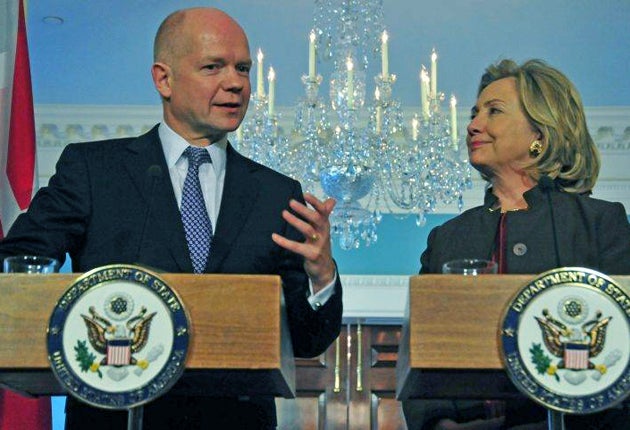Hague's Guantanamo plea overshadows Middle East talks

Your support helps us to tell the story
From reproductive rights to climate change to Big Tech, The Independent is on the ground when the story is developing. Whether it's investigating the financials of Elon Musk's pro-Trump PAC or producing our latest documentary, 'The A Word', which shines a light on the American women fighting for reproductive rights, we know how important it is to parse out the facts from the messaging.
At such a critical moment in US history, we need reporters on the ground. Your donation allows us to keep sending journalists to speak to both sides of the story.
The Independent is trusted by Americans across the entire political spectrum. And unlike many other quality news outlets, we choose not to lock Americans out of our reporting and analysis with paywalls. We believe quality journalism should be available to everyone, paid for by those who can afford it.
Your support makes all the difference.A day after announcing it was to pay millions in tax-payers' money to compensate a group of 16 men who were detained and allegedly tortured by American interrogators at Guantanamo Bay, the Government last night implored the US to free the last Briton remaining there.
William Hague, the Foreign Secretary, made the appeal during talks with the US Secretary of State, Hillary Clinton, in Washington. The issue has attracted a broad mix of reactions in the US, not all of them exactly in tune with the "special relationship" that the two countries insist they enjoy.
Later, after being probed by students at Georgetown University about the decision to pay compensation, Mr Hague hinted that the request for the release of British national Shaker Aamer, one of the men on the list for payment, had been received sympathetically. Officials with the Foreign Secretary declined to give further details on how Mrs Clinton responded.
"I have been discussing that with Secretary Clinton today and reiterated our position that we would like to see this gentleman returned to the United Kingdom and that is under consideration by the United States," Mr Hague told the students.
The meeting with Mrs Clinton also focused on the efforts of the US to bring Israel and the Palestinians back to the negotiating table. Mrs Clinton would not comment on reports that the Israelis are holding out until security guarantees she gave them privately are expressed in writing.
"I can't get into details," Mrs Clinton said alongside Mr Hague at the State Department. "We are in close touch with both the Israelis and the Palestinians." She added that all sides were "working intensively to create the conditions" for the stalled talks to get underway again.
Washington has been pushing Israel to accept a new 90-day suspension in settlement construction in the West Bank. Israeli sources have said that guarantees made to Mrs Clinton in recent talks with Prime Minister Benjamin Netanyahu have drawn Palestinian objections and therefore need to be put on paper.
Mr Hague, in Washington initially to prepare with Mrs Clinton for this weekend's NATO summit in Lisbon, concurred on the importance of saving the peace talks. "There is a pressing need" for them to resume, he said, adding that the US was making a "tireless effort" to make it happen.
At Georgetown, Mr Hague's speech focused on Britain's determination to remain a force in foreign affairs. Its policies would draw strength from preserving the "moral advantage" over its adversaries. He added, however: "As a nation we are not immune from mistakes in foreign policy."
One senior member of the Obama administration admitted in private that he had been "flabbergasted" at Britain's decision to compensate the Guantanamo detainees. Others on the conservative right were similarly offended over the issue. "This is nothing more than appeasement through payment," complained Kirk Lippold, who was commander of the USS Cole when it was attacked in Yemen by al-Qaeda in 2000. "The British Government has chosen to surrender to the demands of terrorists and compromise their nation's, and our nation's, security."
By contrast, liberal voices such as the New York Times interpreted the move as an acknowledgement by the Government that it had colluded with the US post 9/11 on allowing the detainees, either Britons or legal residents in the UK, to be mistreated and illegally tortured.
"It will do no good for this nation's tarnished human rights reputation that at the same time Britain took responsibility for its comparatively minor role in the ill treatment of terrorism suspects, former President George W. Bush was bragging that he had personally authorised the repeated use of a form of simulated drowning," the paper said.
Join our commenting forum
Join thought-provoking conversations, follow other Independent readers and see their replies
Comments